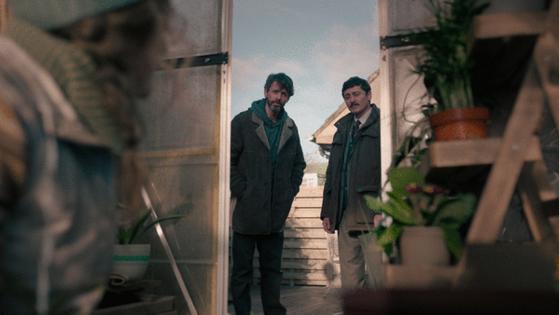'Dept. Q' review: A police detective in Edinburgh is banished to the basement to work a cold case
Published in Entertainment News
Early in the British series “Dept. Q” on Netflix, the bad judgment and smug overconfidence of Detective Chief Inspector Carl Morck results in three people getting shot, including him and his partner. That turn of events, in addition to his already surly personality, has left him with few friends when he returns to work with the Edinburgh police. The calamity happened, it’s pointed out, because he didn’t wait for backup and was instead yammering away and making jokes at a crime scene. Carl is unmoved: “What you call yammering, we call cop-ing.” Well, comes the reply, whatever you call it, you missed the guy with the gun. That’s the sort of thing that gets filed under “you had one job …” so Carl is banished to the basement, out of his boss’s line of sight, and informed that he’s meant to work on cold cases from now on.
His new subterranean digs are in an abandoned portion of the building. There’s discarded furniture strewn about, the lighting is bad and there’s the perpetual sound of water dripping in concert with the building’s groaning pipes. It’s a mildewy place forgotten by time and he resents being exiled, but it also suits his mood. “I heard you were dead,” someone says glibly in passing. “Only on the inside,” comes Carl’s retort.
Nobody can stand the guy — he can barely stand himself — but slowly he builds a small team that consists of Akram (Alexej Manvelov), a member of the IT department and a former Syrian police officer who is thoughtful and watchful. He can also be an unexpectedly formidable physical presence when the moment calls for it. He and Carl are joined by Rose (Leah Byrne), a junior officer looking to do something that matters instead of the drudgery of paperwork. Then there’s Carl’s old partner, Hardy (Jamie Sives), who is laid up in the hospital after the shooting. With nothing else to do between rehab sessions, he becomes an unofficial member of the team, working remotely.
Together, they try to find out what happened to a prosecutor who disappeared four years prior. The case takes up the entirety of the nine-episode season, which weaves in sardonic humor and well-worn cop show tropes to focus on a grisly case.
It’s an intriguing setup (from show creator Scott Frank, based on the book series by Jussi Adler-Olsen) that doesn’t always follow through on its promise. Some of that comes down to the casting of Matthew Goode as the miserable, perpetually sarcastic Carl. Goode is a talented but not especially versatile actor who tends to read as somewhat posh on screen. Carl is downmarket and rough around the edges, so there are attempts to give Goode a vaguely more grizzled look, with a beard and a rumpled sheepskin coat, but it’s not enough to help him convincingly disappear into the role. He’s a strong actor despite being miscast, but it’s distracting to the point where you start wondering who might have been a better choice.
Carl’s mood is antically morose, verging on self-pitying, and he would be content to stew in that basement, getting nothing done. But it’s Akram who digs through the files and finds the case of the missing prosecutor. He thinks there’s a chance she’s still alive and goads Carl into getting off his duff and earning his keep. Meanwhile, we learn that Akram’s hunch is right and the woman (played by Chloe Pirrie) is being held hostage in a hyperbaric chamber that resembles a small submarine. Her captors keep asking her to confess to the mysterious transgression that has left her to this terrible fate. She racks her brain and comes up with names, and each time she’s wrong. So she remains in that tiny chamber. Sometimes they turn up the pressure — the structure was originally intended to help deep sea divers avoid decompression sickness; now it’s used for uglier purposes — just to torture her some more. These scenes are interspersed throughout the investigation. Will Carl, Akram, Rose and Hardy find her before she finally succumbs to her tormentors?
Carl is a bull in a china shop, whereas Akram is so much more interesting. He’s a refugee and maybe that’s why he’s so quiet and respectful. Too respectful, perhaps, but he’s also confident in his own talents and intelligence. It’s an entrancing performance from Manvelov and I wish the show were built around his character rather than the same old cliches embodied by Carl, who has also been assigned to mandatory therapy sessions after the shooting and — surprise! — he doesn’t want to be there or talk about any of it. His therapist (Kelly Macdonald) doesn’t want to be there either; it’s a bad job talking to you lot, she tells him. She means cops. “Doesn’t sound like you like your job very much,” he says. “Would you like talking to you?” Fair point, he concedes.
The story is pulpy in ways that are sometimes unexpectedly dull, but I appreciate that one ongoing theme concerns the idea that police work is often corrupt. Of cops looking the other way when it’s convenient, or someone else benefits.
That basement office where Dept. Q is headquartered may be dank, but it’s atmospheric and cozy in its own way. Ultimately, the combination of Carl, Akram, Rose and Hardy makes for a compelling crime-solving foursome.
———
'DEPT. Q'
2.5 stars (out of 4)
Rating: TV-MA
How to watch: Netflix
———
©2025 Chicago Tribune. Visit chicagotribune.com. Distributed by Tribune Content Agency, LLC.













Comments